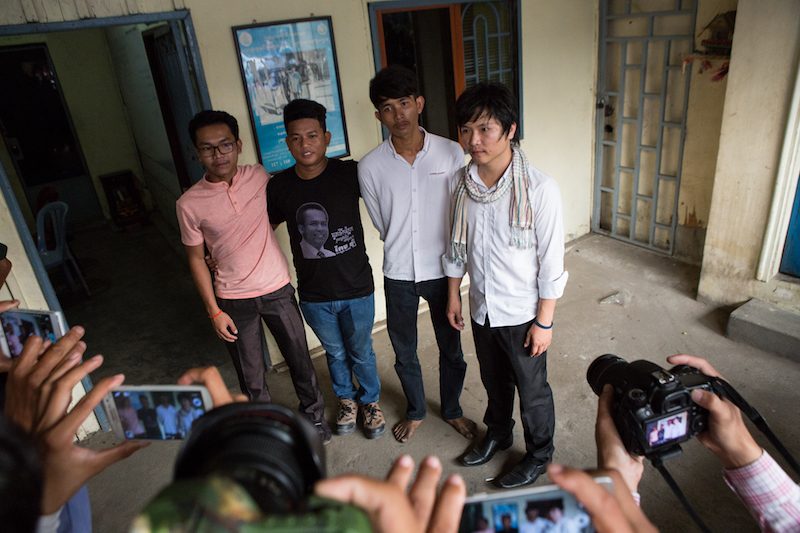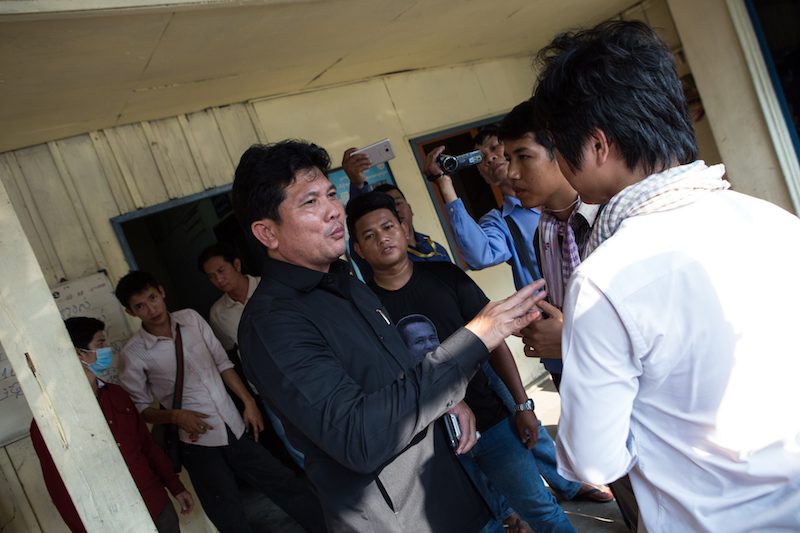A 30-minute documentary about the murder of political analyst Kem Ley, which was released online months ago, has become the latest work about a slain critic added to the government’s list of restricted films.
Four members of the Khmer Student Intelligent League Association (KSILA), an organization of young political analysts and activists, planned a small screening of the film with Khmer subtitles at their office in Russei Keo district on Sunday afternoon, but were detained after about 40 police and military police officers interrupted the event.

“Cambodia’s Deadly Politics,” released in January by Qatar-based news outlet Al Jazeera, joins “Who Killed Chea Vichea?” and “I Am Chut Wutty” as being deemed by the state as potential tools to incite public disorder, a government spokesman said.
The group of students—Moung Sony, Soung Neakpoan, Vorn Channout and Heng Sam-nang—was able to walk free from the police station after signing a contract promising not to attempt to screen the film again without permission. They also agreed to hand over their copy.
The documentary does not reach any conclusions about who killed Kem Ley, but is highly critical of the government’s response and includes claims that the suspected shooter had attended meetings with government officials in Siem Reap province before heading off in a taxi to Phnom Penh days before the shooting.
Russei Keo district governor Chea Pisey and district police chief Tieng Chansar questioned the young activists on Sunday while military police and reporters milled about the interrogation room’s entrance.
Mr. Pisey made no attempt to keep his voice down as he threatened the group, all aged in their 20s, with prolonged detention and prosecution.
“You have to make a contract to stop every action and give me the video footage,” he said. “If not, I won’t allow you to go anywhere.”
One of the students replied: “It seems oppressive to us.”
Mr. Pisey said the group had broken the law.
“It is not oppressive—you are committing criminal offenses,” he said, outlining offenses such as “public dissemination,” “incitement” and disobeying authorities.
“As chief of the district government, I will ask the prosecutor to detain you here,” he said.

Mr. Chansar, the police chief, told reporters outside the room that authorities did not allow the screening because the trial of Kem Ley’s suspected killer—a former soldier who claimed to have killed his victim over $3,000—was ongoing.
Mr. Ley was gunned down in a convenience store last July in what many saw as a return to political violence of the past. The secrecy of the ensuing investigation has only fueled speculation of a state-sponsored hit.
The trial of the alleged killer, Oeuth Ang, earlier this month lasted only a few hours. A verdict is expected on March 23.
Mr. Sony, who is the president of the KSILA, said Sunday’s confrontation was purely political.
“I think it was related to a political issue rather than enforcement of the law,” he said, adding that the governor’s threats were not taken lightly and led them to sign the agreement in order to walk free.
“He said if we do not sign a contract, he will not release us; that we are committing an obvious crime and incitement.”
The contract stipulates that the four are not to “screen video footage that is related to the murder of Dr. Kem Ley’s case without permission from authorities.” If authorities do not grant permission, the group “will not screen video footage of Dr. Kem Ley or activity that can cause public disorder in society,” it adds.
Government spokesman Phay Siphan said the video was not banned outright, but needed to be regulated. Activists who screen it were trying to “incite the people against the court or the government” and were therefore breaking the law, he said.
“They did not ban the video—they banned the activists from it,” he said of authorities.
Mr. Siphan said the KSILA members were known to the government, and their activities were being watched.
“We monitor that group,” he said. “Those people are activists against the government—we know very well.”
Lao Mong Hay, a political analyst, planned to attend the screening on Sunday but ended up monitoring the questioning.
“They always say, ‘You have broken the law,’ without specifying which law,” he said, adding that the prosecutor who was present referred to vague articles in the Criminal Code relating to obeying law enforcement and contempt for the court.
“I doubt the provisions are relevant to the case. The function was held in a private property,” he said. “Watching something is not a crime.”




